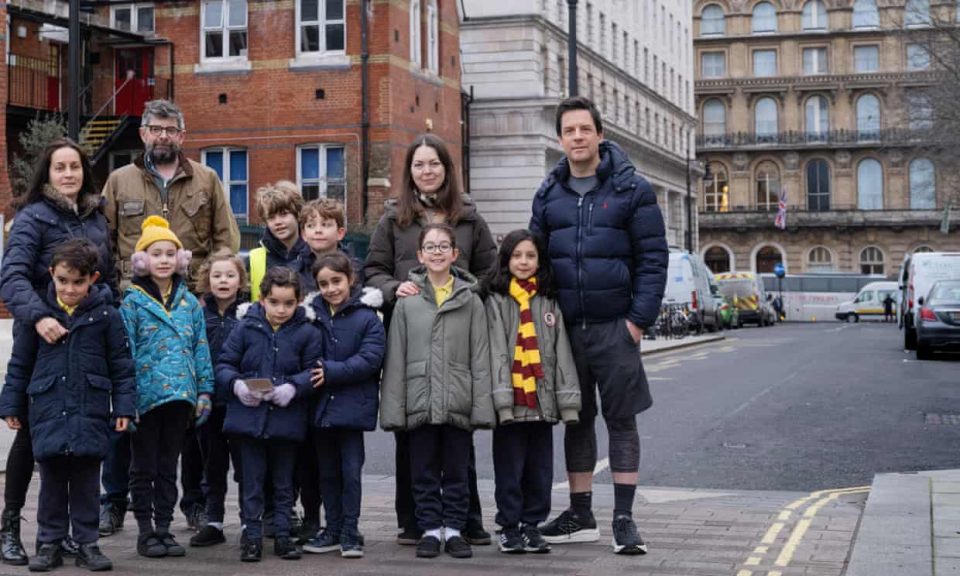Parents at a primary school in central London are expressing feelings of disappointment and frustration after local planning officials recommended against the establishment of a new playground, citing concerns that it would negatively impact the view of a nearby five-star hotel.
St Peter’s School in Belgravia currently has only a modest play area measuring 170 square meters for its 200 students, situated just minutes away from Victoria station in one of London’s most densely populated areas.
Rebecca Bryant spearheaded a two-year initiative aimed at creating this playground, which would involve closing part of the adjacent road to through traffic. Parents have noted that while traffic is generally busy at either end of the street, it remains quiet enough to allow for children’s play, with very few vehicles passing during peak times and school drop-off. Many local children live in flats and urgently need space to play, Bryant emphasized.
“I have dedicated two years to securing a new playground for the school. This is a wonderful community and the school makes the most of its limited space. The shortage of appropriate play areas is exacerbated by the extreme lack of local parks and green space… many children live in apartments, and the closest park is a mile away,” she said.
Bryant successfully raised £100,000 for the project’s design and feasibility assessments, with £84,000 sourced from Westminster Council through its community infrastructure levy.
Despite these funds, the council advised against proceeding with the playground, citing the preservation of the view of the back of the grade 2-listed Clermont Hotel in Victoria, which was formerly known as the Grosvenor Hotel, among its reasons.
In a letter of pre-planning advice, for which parents paid over £2,000, a planning officer stated: “The current playground space is inadequate… however, the proposed advantages… do not outweigh the detriment caused by the loss of public road access… and the disruption the playground would inflict on the townscape.”
The officer continued: “The proposed playground extension is seen as detrimental to the character and aesthetics of the conservation area, as well as that of the grade 2* listed Grosvenor Hotel. This impact is likely to be considered ‘less than substantial’… yet it would reside at the upper end of that spectrum. As such, an application would not be favorably regarded.”
Additionally, the letter indicated: “The introduction of a netted sports court would lead to a cluttered streetscape… [and] the parking spaces on Lower Belgrave Street and the single yellow loading zones are… heavily utilized, making their loss unacceptable.”
Seven-year-old Benji, waiting to enter school, expressed his longing for more play space. “Sometimes after school I ask my friends if they want to play, but there’s no place for us to gather so it just doesn’t happen.”
He mentioned that he tries to play football in the limited area available. “We practice penalties in one corner. But with a larger playground, we could have designated areas for skipping, games, and football. Then we could even form a St Peter’s football team.”
When asked about options for running, Benji suggested: “You could jog around the block?”
His mother, Charlotte, shared, “I have lived in Pimlico for 22 years. I work nearby, my kids attend school here—we want them to be part of this community. But they need room to play.”
In response, Westminster council stated to the Guardian: “The view of the hotel is neither the main concern nor the reason for advising against the playground’s planning consent.
“Extending the playground onto the highway would be wonderful, but it simply isn’t feasible. This has been communicated to the parents on several occasions, including in writing after a formal inquiry. This is a busy central London region, and the road is essential for traffic servicing multiple office buildings, one of which is associated with the site planned for Crossrail 2. It’s not suitable for a playground.”
However, Bryant contended that it is “completely inaccurate” to say the council informed the school that the playground would never be viable. “If they had made that claim, they would have saved us—and the public funds—considerable amounts of money. This statement bears no relation to the official advice we received.”
Last March, the scrutiny committee for the Department for Levelling Up, Housing, and Communities conducted an inquiry focused on children, young people, and their interaction with the built environment.
Chaired by MP Clive Betts, the inquiry gathered testimonies from architects, planning professionals, healthcare providers, and child development experts concerning the inadequate provisions for children in planning processes. The committee was dissolved before its findings were published due to an upcoming general election.
Betts highlighted that children’s needs should receive greater consideration in planning matters. “We would have produced a critical report had we been able to. Children are nearly overlooked. They are mentioned only once in the national planning policy framework. If we don’t address this, we will create an environment unfit for future generations.”
While recent Labour policy has aimed at reducing bureaucratic hurdles to expedite new housing developments, Betts argued that this shouldn’t come at the expense of children’s needs.
“This isn’t about stalling planning efforts. I am committed to increasing housing availability, but we can’t design spaces focused only on vehicles at the exclusion of children’s play and mobility; these considerations must not be secondary.”
Bryant remarked that the council’s response illustrates a lack of attention to children’s needs and experiences in the planning framework. “As a civil servant skilled in managing infrastructure projects, I ensured that our planning and feasibility studies were conducted with the utmost rigor.
“We assessed traffic patterns, revealing minimal impact, and we have secured backing from key neighborhood groups. The council seems to prioritize heritage and paid parking over the health and well-being of local children.”
She drew attention to a statement in the planning advice that referred to visitors to the street enjoying the view: “It mentions that ‘the proposed loss of public access to the land… prevents areas from which the public can appreciate views of the listed building.’ We are discussing a dusty wall at the back of a hotel.”
Furthermore, Bryant revealed: “We met with Deirdra Armsby, the director of town planning, in person, and she indicated she would explore the situation—we have since emailed her eight times without receiving any response. Other senior council members, including Westminster’s leader Adam Hug, have also not replied to us.”
Westminster council did not provide a response to inquiries regarding the alleged lack of communication with parents over email.
This article was updated on 7 February 2025 to eliminate certain personal details.


